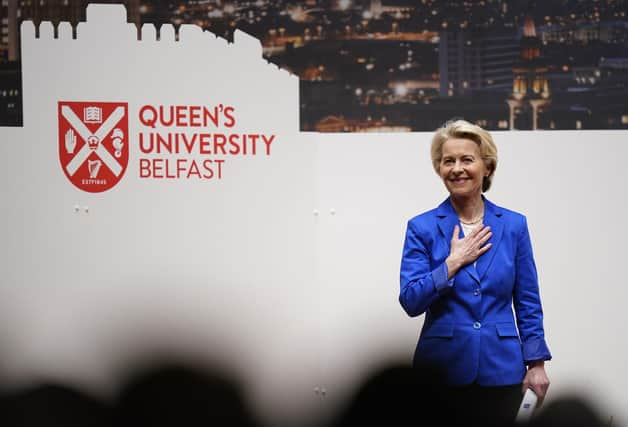Belfast Agreement @25: I do not believe that Northern Ireland realised the economic potential of devolution, writes Esmond Birnie


Almost inevitably the 25th Anniversary of the 1998 Agreement has provoked a lot of analysis. It is a pity that some of this turned out to be collective or mutual self-congratulation. It is a pity that some of this turned out to be collective or mutual self-congratulation.
Some people, and some political leaders, made sacrifices to attain relative peace and that should be commended. The relative peace we’ve had since 1998 is better in many ways compared to the 30 years before 1998. What has tended to be forgotten in much of the recent commentary is that we cannot make our way in the world based on sentimentality. Our thinking about public policy needs to have a harder edge, particularly when it comes to the economy.
Advertisement
Hide AdAdvertisement
Hide AdThe 1998 agreement was overwhelmingly about politics, that may seem like stating the obvious, but it wasn’t designed to promote more efficient government or the long run growth and development of the economy. Probably the choices made at that time were necessary given the conditions at that time but, for sure, the politics of the next 25 years need to be much more about the economy.
There are a number of reasons why we will have no choice but to have that focus on the economy: Levels of national debt post-Covid imply that the UK government has much less scope to subsidise Stormont with financial packages and other special arrangements.
Since the late 1970s we’ve relied on the Barnett Formula to allocate Northern Ireland a share of UK increases in public expenditure (usually somewhat related to NI’s share of total UK population).
In recent years it is becoming apparent that a so-called ‘Barnett Squeeze’ is occurring.
Advertisement
Hide AdAdvertisement
Hide AdNorthern Ireland’s hitherto very substantial advantage relative to England in terms of levels of public spending per person is declining quite rapidly. This implies a challenging time ahead for NI’s public sector. When the Stormont Executive did operate during 1999 to 2023 there was a tendency for all the Northern Ireland parties to act as though they were still in opposition. Going forward we cannot afford such irresponsible government. There is a limit to how far the can be kicked down the road.
At some point hard decisions (eg structural reform of the health service, introduction of domestic water charges, how do we pay for the transition to Net Zero) have to be taken. During 1998-2023, as in previous decades, Northern Ireland was falling behind in the economic race.
When Northern Ireland came into being in 1921 it was one of the richer parts of Europe. Today our level of GDP per person is much lower than all the Scandinavian economies, Italy, Japan and also some former communist bloc countries (Czech Republic and Slovenia) and even some former non-industrialised countries (eg Israel, S. Korea and Taiwan).
Economics is the study of how people respond to incentives and constraints. That said, it does not bode well for developing policy in Northern Ireland which is rational and evidence-based that what we’ve seen in the last few weeks is use of statements about the economy as a stick to beat people towards a particular political outcome: a return to the executive alongside an acceptance of the Windsor Framework.
Advertisement
Hide AdAdvertisement
Hide AdOf course, there could be some economic dividend if Stormont returned and if, big if, the devolved executive governed well. Unfortunately, the hard evidence is lacking that during 1999-2023 Stormont did provide such good government.
Northern Ireland’s level of GDP person remained stuck at the same 80% level compared to the UK average. Policies were often read across from Great Britain. When bespoke policies were applied the results were sometimes very poor: Renewable Heat Incentive (RHI). Hard choices were indefinitely postponed. Those who argue most strongly for a return to Stormont together with the Windsor Framework rarely recognise that that the framework actually reduces Stormont’s ability to adopt appropriate economic development policies.
We should similarly ask questions about the evidence base for President Biden’s assertion that hundreds of American companies are simply waiting for Stormont to return and would then invest in Northern Ireland. There is always a pipeline of potential inward investment projects but the factors influencing the decisions of international businesses are complex. The president did not help his case by making inaccurate statements about Northern Ireland’s GDP doubling during 1998-2023 (repeated by the European Commission president Ursula von der Leyen yesterday in Belfast) or by making wild claims about tripling the size of the regional economy.
We should, of course, recognise that Northern Ireland has already been very successful in terms of the rates of US inward investment, particularly in IT and financial services. At the same time we need to be realistic and ask why it is that hitherto we have not been able to transform our region into a higher wage and high productivity economy. So, we most properly mark the 25th anniversary of the agreement by thinking realistically about whether during the last 25 years we really achieved the potential of that agreement.
Advertisement
Hide AdAdvertisement
Hide AdI do not think we did realise the potential of devolution. Realising that potential, especially with respect to the economy is not going to be easy but a good start would be stop using statements about the economy as tools to engineer particular political outcomes.
• Dr Esmond Birnie is Senior Economist at University of Ulster and a member of the Fiscal Council. He is writing here in his capacity as an independent economist